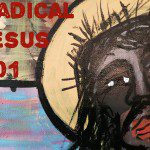I put aside my original sin blog series idea for a while, but I’m preaching on baptism this weekend so I figured it would be worthwhile to go back to it. I did a post a month ago on Romans 5, the most extensive discourse which names Adam’s trespass as our problem. I raised a lot of questions about the mainstream interpretive presumptions about it. So this is part 2 where I will look at 1 Corinthians 15:22 and Ephesians 2:3. Part 3 will be the Garden of Eden itself (which I should have opened with) and part 4 will look at the theological investments behind this doctrine (since it’s my contention that original sin is not a self-evident conclusion from pure Biblical exegesis but a creation of systematic theology whose necessity by the way I don’t necessarily dispute).
I. 1 Corinthians 15
1 Corinthians 15:22 is cited by the Catholic catechism as one of the proof-texts of original sin: “For as in Adam all die, so in Christ all will be made alive.” The thought is that because all die “in Adam,” this means that Adam’s sin has been imputed to all. I’m very interested in the prepositions here. If Paul were describing the present result of a past historical event by a specific individual person, it would make a lot more sense for him to say δι’ Ἀδὰμ (through/by way of Adam) than ἐν τῷ Ἀδὰμ (in the Adam). Saying that we are “in the Adam” seems to make Adam into a typological category for humanity rather than a historical figure.
Paul uses the article τῷ for both Adam and Christ in this sentence. But when he is talking about specific people, he doesn’t use the article at all (e.g. ὤφθη Κηφᾷ, “he was seen by Peter,” v. 5). He also often doesn’t use the article when he’s talking about the historical person Christ (ὅτι Χριστὸς ἀπέθανεν, “that Christ died,” v. 3), though he does say that God raised the Christ from the dead (ἤγειρεν τὸν Χριστόν, v. 15). Of course, calling Jesus “the Christ” is unique because it’s a label for his role as the anointed one. It’s similar to the way that someone can say “Pastor visited me” or “the pastor visited me.” In any case, I don’t think it’s immaterial that Adam is referred to as “the Adam” and it really is a significant edit to remove “the” from the translation (a-hem, NIV!).
The other thing that’s relevant to point out is that none of Paul’s discourse in 1 Corinthians 15 makes any reference to sin or punishment. It’s addressing the question of whether people will be resurrected from the dead. In fact, 1 Corinthians 15:29 is the verse Mormons use as their basis for baptizing the dead. Check it out: “Now if there is no resurrection, what will those do who are baptized for the dead? If the dead are not raised at all, why are people baptized for them?” So whether it’s an embarrassment to us or not, people were baptized on behalf of the dead presumably so that the dead could receive their salvation upon resurrection. Paul is using this practice as a basis for his argument that resurrection is real.
Now there is a way in which 1 Corinthians 15 is relevant to the question of original sin even if it doesn’t support an imputed “guilt” from a historical figure named Adam to the human race. What Paul does say is that there are two kinds of humanity, which we could call Adamic and Christian. Those who are Adamic (ἐν τῷ Ἀδὰμ) are mortal, while those who are Christian (ἐν τῷ Χριστῷ) will rise from the dead. So we can claim that this text says death itself is imputed to us from our ancestors, “the Adam,” and that unless we are incorporated “in the Christ,” we will not be resurrected.
II. Ephesians 2:3
Ephesians 2:3 is another proof-text for original sin because it says, “All of us once lived among them in the passions of our flesh, following the desires of flesh and senses, and we were by nature children of wrath, like everyone else.” The NIV engages in a breathtaking theological edit in its translation making τέκνα φύσει ὀργῆς into “children deserving of wrath” (there is no way to make physei, the root word for our word physical, into “deserving of”, no matter how desperate you are to cram the whole Bible into your Four Spiritual Laws). In any case, the implication for original sin from this passage is that if we are “children of wrath,” then we are in some way descended from wrath, or something that provoked (God’s) wrath is passed down to us from our ancestor.
I’m not sure we should read too much ancestry into the phrase τέκνα φύσει ὀργῆς just because it says “children of.” It is a very common construction in Hebrew to denote a category of people by writing ben (son of) and then the category, e.g. ben adam (son of man) or ben elohim (son of God). So Paul could be thinking in Hebrew and writing in Greek. Also tekna doesn’t necessarily have to mean “descendent” anyway. It could simply connote “youthfulness.” Though ὀργῆς is in the genitive form, the presence of the φύσει in the phrase makes me think that we should translate it “children of a wrathful nature” (immature young people with volatile emotions) rather than “children of wrath by nature” (descendents of a primordial wrath-causing event).
In any case, there is a legitimate original sin application in this passage. It is definitely a stretch to turn the phrase τέκνα φύσει ὀργῆς into a claim that God is mad at us for something a guy named Adam did long ago. However, the reality is that we start out being “children of a wrathful nature,” and we need to be rescued from our mess. We do not evolve, without God’s help, out of our default mode of living according to the desires of our flesh and senses. And this isn’t because God messed up in creating us. How we got to be people who behave irrationally and harmfully after being created by a perfectly loving and rational God is the mysterious blank that original sin seeks to fill in.














